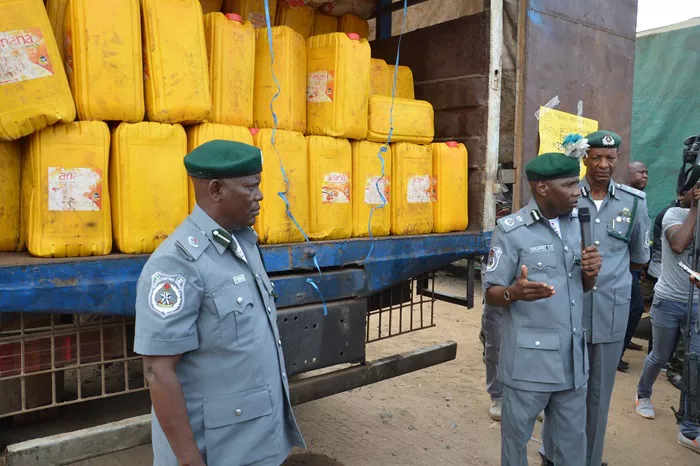Nigerian authorities are grappling with a renewed wave of petrol smuggling, driven by widening price disparities between Nigeria and its neighboring countries. Currently, petrol is priced at approximately N701 per litre within Nigeria, a stark contrast to around N1,787 per litre in neighboring Benin and Cameroon. This discrepancy has created a lucrative incentive for smugglers, resulting in an estimated daily smuggling of 67 million litres of petrol.
Despite federal assurances of the elimination of petrol subsidies, recent admissions from the Nigerian National Petroleum Corporation (NNPC) reveal ongoing financial challenges. On Monday, the NNPC disclosed that the cost of handling shortfalls in Premium Motor Spirit (PMS) importation is projected to reach N6.8 trillion by December 2024.
Minister of State for Petroleum Resources, Heineken Lokpobiri, attributed the resurgence in petrol smuggling to the significant price gap between Nigerian fuel and that in neighboring West African countries. Speaking at the 3rd edition of the Petroleum and Natural Gas Senior Staff Association of Nigeria (PENGASSAN) Energy and Labour Summit in Abuja, Lokpobiri emphasized that the economic incentive for smugglers remains high despite law enforcement efforts.
“The disparity in fuel prices makes smuggling an almost unavoidable issue,” Lokpobiri remarked. He underscored that while Nigeria is dedicated to enhancing energy security and advancing its role in West Africa, the current situation reflects a broader challenge that affects the entire subcontinent.
The minister also addressed the broader context of Nigeria’s energy strategy, noting the country’s commitment to transitioning to greener energy sources while maintaining a reliance on fossil fuels for revenue. This transition, he argued, is essential to funding the shift to more sustainable energy solutions.
In contrast, NNPC’s Chief Financial Officer, Umar Ajiya, clarified that the corporation has not paid any subsidies directly. Instead, he explained that the term “subsidy shortfall” refers to the financial gap between the landing cost of petrol and its retail price. This financial strain has impeded the NNPC’s ability to remit taxes and royalties to the federation account, with a projected cumulative shortfall of N6.884 trillion by December 2024.
PENGASSAN President, Comrade Festus Osifo, in his opening remarks at the summit, highlighted the critical juncture facing Nigeria’s oil and gas industry. He called for a diversified energy mix incorporating renewable sources and innovative technologies to bolster energy security and national progress. Osifo also emphasized the growing role of artificial intelligence (AI) in enhancing industry efficiency and competitiveness while reaffirming PENGASSAN’s commitment to addressing crude oil theft through collaboration and technological advancement.
The summit is expected to generate policy recommendations crucial for shaping Nigeria’s economic future amidst recent government policies affecting the Naira and the cost of imported goods.
Related topic:
What Is The Best Quality Gasoline? [Revealed]

